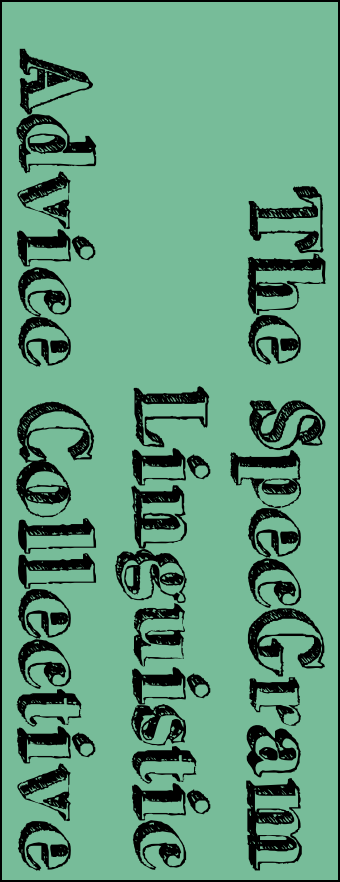


Are you in a world of linguistic hurt? The SpecGram Linguistic Advice Collective (SLAC) will offer you empirical, empathic, emphatic advice you can use!*

Remember, if you can tell the difference between good advice and bad advice, then you don’t need advice! So, if you need advice, trust us
Your Royal SLACness,
Since you have previously offered such useful advice on English plurals, I have a query of my own: what is the plural of haggis? Having recently relocated to the land of tartan and bagpipes, I would find it quite useful to know.
And speaking of which, where can I find one of those “wild haggis” things the locals keep telling me about?
—Bewildered Ness
Dear Noun-
Haggis is a strong(-smelling) noun, so therefore it takes an irregular plural. If someone claims to have seen more than one wild haggis, the word for that is hogwash.
—SLAC Unit #456d696c79
Dear Wildness,
Haggis originally was haggies, the plural diminutive of a shortened form of hagfish. These super-
—SLAC Unit #4b65697468
Hoots Nessie,
Ah’m a proper Scotsman and in mah kilt, ah c’n gie ye a haun wi’ yon question. The plural o’ haggis? Och, laddie, it’s breakfast.
Yours halfway up the Great Glen,
—SLAC Unit #4a6f6e617468616e
Found in Haggipedia:
The plural of haggis is hagi. They are known for their tendency to regift items for birthday and holiday presents. Such items are commonly called The Gift of the Hagi. They are notoriously cheap and try to bring down the price of any item they desire. This is called haggling. Common lore is that they once were a matriarchal society with the leaders called hags whose stories were written down in books called hagiographies.
—SLAC Unit #4a6f65
Dear Braveheart,
Haggis is originally a loanword into Scottish Gaelic from Greek. Greek settlement of Hibernia in the 3rd century BCE has left virtually no imprint on the history of the area, other than this word and the large parthenon at John O’Groats. Due to its frequency of usage, the word has retained its originally phonetic form, which in Attic was of course ἇγγις (and don’t forget that double-γ is [ŋ]!) which goes like πόλις. The plural (nominative) is therefore ἅγγεις as in “I’d love five hangeis please, Macdougal, for ma wife and bairns back in the croft, och aye the noo,” or, more famously, “You can take our lives but you’ll never take our hangeis!”
—SLAC Unit #4465616b
P.S.: Not untangentially, look out for the third in the acclaimed Margaret Atwood series which paints a bleak but thought-
Dear Ness,
Haggis is from the Latin hagis, hagidis “innards”. Also used as an adjective, meaning “revolting”.
—SLAC Unit #4d61726b
Somebody (rhymes with “ACK Slunit #4a6f6e617468616e”) has an unfair advantage.
—SLAC Unit #4b65697468
Yeah, but he also has to eat haggis, so it all balances out.
—SLAC Unit #4d696b61656c
Being a Scot is indeed an unfair advantage. But it’s one I’ll humbly carry. Also, haggis is lovely. At least we don’t eat “grits” (what even is that? We use grit to make roads less slippery.) Also, biscuits and gravy? Who in their right mind would dunk a custard cream in Bisto? That is as odd as using a microwave to make tea.
—SLAC Unit #4a6f6e617468616e
Dear Bewildered Mess,
Haggis has no plural. Why on earth would anyone want more than one of them?
—SLAC Unit #50657465
Dear Aunt Bee,
The plural is haggadah, which has also come to mean the text for the only occasion on which one might need more than one haggis. The origins of this tradition are as confused as the people who started it after possibly taking a wrong turn on their way out of Egypt. The Scottish haggadah is unique in a number of ways, such as not having a question about why they eat vegetables every other night. Theologian Robert Burns’s theory that the Scottish haggadah was based on a meal eaten by King David was later memorialized in the song In Haggadah Davida by Irn-
—SLAC Unit #56696e63656e74
Dear Lady of the Loch,
The correct plural of hagg— ahem. The plural of haggi— hmmm. The plural of ha—... of hagg—... of haggis....... /βːː βː ʛɑ̰̙ːːʀʁːːːkʼ/
< clean up on aisle 4! >
—SLAC Unit #54726579
* Advice is not guaranteed to be useful, practical, or even possible. Do not attempt at home. Consult a doctor (of linguistics, philology, or
 |
SOS to the Rescue |
 |
Οо Εе, Оο Аa Αa |
 |
SpecGram Vol CLXXXVII, No 4 Contents |